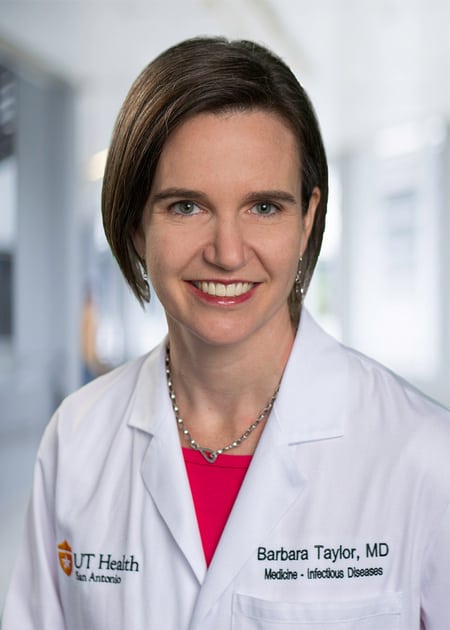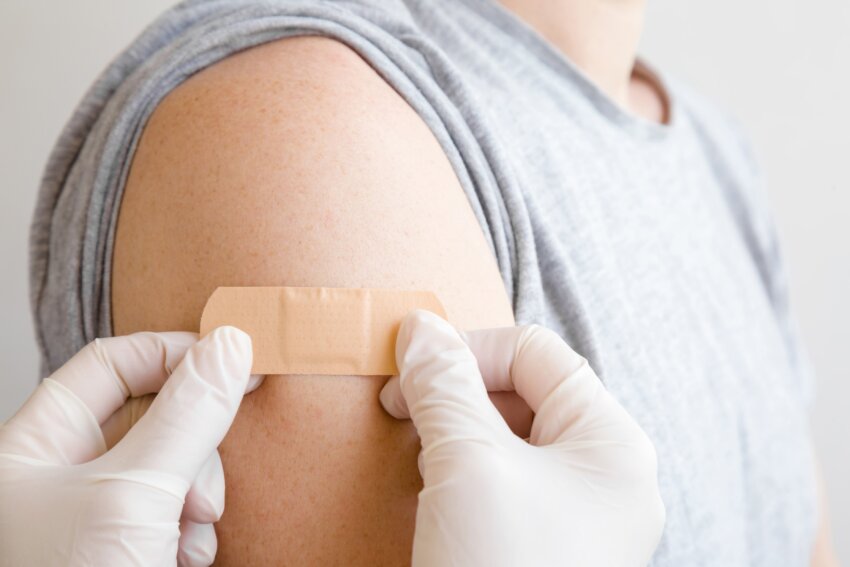
Media contacts: Will Sansom, UT Health San Antonio, (210) 567-2579, sansom@uthscsa.edu
Shelley Kofler, University Health, (512) 294-5224, Shelley.Kofler@uhs-sa.com
SAN ANTONIO (Jan. 27, 2022) — The University of Texas Health Science Center at San Antonio and clinical partner University Health soon will begin a Phase 1 clinical research study of an HIV vaccine candidate produced by Moderna. This will be San Antonio’s first-ever study of an mRNA HIV vaccine.
The study, which will enroll up to 15 patients locally, is sponsored by IAVI, a global nonprofit scientific research organization. UT Health Science Center San Antonio, University Health, the Fred Hutchinson Cancer Research Center, George Washington University and Emory University are the trial sites, and Moderna is providing the vaccine. The Bill & Melinda Gates Foundation helped fund the vaccine candidate research.

“We seek healthy volunteers who are passionate about contributing to the science of developing an HIV vaccine,” said local principal investigator Barbara Taylor, MD, MS, assistant dean and associate professor of infectious diseases at the health science center’s Joe R. and Teresa Lozano Long School of Medicine. Dr. Taylor is also a clinician treating patients at University Health. Volunteers will be enrolled for durations ranging from six to 11 months depending on the arm of the study to which they are randomized. They will be compensated for their time. Outpatient examinations and blood analysis will be conducted at University Hospital to measure the effects of the vaccine.
“The strategy under study involves two mRNA vaccines, one a prime and one a boost,” Dr. Taylor said. “IAVI already completed a first-in-human trial with a protein-based version of the prime. The second shot, the boost, is being tested for the first time in humans in our study.”
The goal of the San Antonio site’s study is to demonstrate safety of the mRNA-delivered priming and booster dose of the HIV vaccine candidate. The study is evaluating the immune response to different parts of the vaccine, specifically the development of responses that could create broadly neutralizing antibodies (bnABs). The ultimate goal is the development of a series of vaccine candidates that prevent human immunodeficiency virus (HIV) infection. A globally effective HIV vaccine could lower infection rates and prevent illness and deaths from the disease caused by HIV, acquired immunodeficiency syndrome (AIDS).
No one at risk for HIV will be enrolled, and no pregnant women can be included.
The COVID-19 pandemic has shown the safety and effectiveness of messenger RNA vaccines. Sort of like a recipe does for a chef, these vaccines provide instructions (mRNA) to the body’s cells on how to make a harmless protein. The resulting protein particle stimulates an immune response. Once the particle is made, cells delete the mRNA instructions, but the immune response, now learned, remains.
“For many of us, one of the few bright lights of the COVID-19 pandemic has been the demonstration of the utility of mRNA technology,” Dr. Taylor said. “We’ve seen it work for COVID and it has been truly amazing, but it doesn’t have to stop at COVID. We can take this new strategy and apply it to an unfortunately old and hard-to-crack problem, HIV.”
For more information and to volunteer, visit UTHealthResearch.com or call 210-469-3206.
The University of Texas Health Science Center at San Antonio, also referred to as UT Health San Antonio, is one of the country’s leading health sciences universities and is designated as a Hispanic-Serving Institution by the U.S. Department of Education. With missions of teaching, research, patient care and community engagement, its schools of medicine, nursing, dentistry, health professions and graduate biomedical sciences have graduated 39,700 alumni who are leading change, advancing their fields, and renewing hope for patients and their families throughout South Texas and the world. To learn about the many ways “We make lives better®,” visit www.uthscsa.edu.
Stay connected with UT Health San Antonio on Facebook, Twitter, LinkedIn, Instagram and YouTube.
About University Health
University Health is San Antonio’s only locally owned health system and the only academic medical center in South Texas. Its University Hospital serves as the region’s Level I trauma center for adults and children, and is the only area hospital to be state-designated at the highest level for both its Maternity Center and Neonatal Intensive Care Unit. Outpatient care is provided through a comprehensive network of urgent, primary and specialty care centers. For more than 100 years, University Health has been committed to delivering compassionate, culturally competent and high-quality health care, based on a strong foundation of outcomes‐based research and innovative teaching. Learn more at UniversityHealthSystem.com. Follow us on Twitter and Facebook.
IAVI release: https://www.iavi.org/news-resources/press-releases/2022/iavi-and-moderna-launch-trial-of-mrna-hiv-vaccine-antigens



